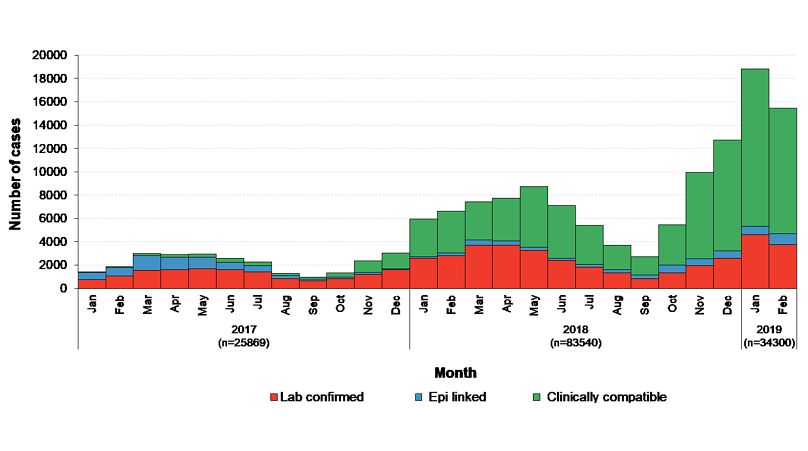Starting now, all children in Germany must be vaccinated against measles. Their parents can face large fines if they don't follow the new law.
Parents in Germany must vaccinate their children against measles or face substantial fines, according to a new law that takes effect this month.
 ADVERTISEMENT
ADVERTISEMENT
 ADVERTISEMENT
ADVERTISEMENT
The controversial new regulation was approved last year after the country recorded more than 500 cases of the disease.
Germany's Minister of Health, Jens Spahn, said education about the importance of vaccination was not enough.
"Measles is a highly infectious virus and can take a very bad turn," he said. "It is not treatable. There is no medication for it. People have to go through it entirely."
Parents must provide proof of immunisation
The new law, which took effect on Sunday (March 1), applies to all German schools and daycares, as well as related spaces such as refugee shelters and clinics.
Parents will have to prove that their children have been vaccinated before they can enrol at daycare or a school. The transition period for all other institutions will last until mid-2021.
Unvaccinated children cannot be excluded from schools due to Germany's mandatory school attendance laws. However, if children have not been immunised, schools will be required to notify their local public health offices and parents may face a fine of up to €2,500.
The law also applies to teachers, doctors and facility managers.
Only adults born before 1970, children younger than one year old and anyone who can prove a physical intolerance against the vaccine are excluded from the rule.
While Germany's Ethics Council is against general mandatory vaccination, it has come out in favour of immunising specific professional groups.
A strong counter-movement
Some politicians and citizens have expressed strong objections to the law, arguing that it infringes personal rights.
However, Jahn says that personal freedom "also means that I can trust that others will not unnecessarily endanger me."
Many of those opposed to the law believe in the effectiveness of measles vaccinations but have other issues with it.
A group of parents filed a complaint at Germany's constitutional court arguing that the rule violated their right to make their own decision based on "relevant, independent and neutral information."
Initially, the law was meant to be a set of amendments to the Protection Against Infection Act, the same law currently helping Germany to manage the COVID-19 outbreak.
Measles cases in Europe have been increasing
According to the World Health Organization (WHO), about 95% coverage is recommended to prevent a mass outbreak. However, Germany's centre for disease control and prevention, the Robert Koch Institute, reported that only 93% of children starting school have received both doses.
The Centre for Disease Control and Prevention (CDC) recommends that children receive the measles vaccine in two doses, one at 12-15 months and another at 4-6 years of age.
After the first dose, the child is about 93 per cent immune and only the second dose is 97 per cent effective against measles.
Measles can be serious or even fatal for small children and the disease kills more than 100,000 people a year, mostly under the age of five.
While the number of measles cases has fallen globally in the past two decades, 2019 registered a jump of 300 per cent in the first three months compared to the same period in 2018.
In recent years, the anti-vaccine movement in Europe has been growing steadily. Health experts say these "anti-vaxxers" may be to blame for the rise in measles cases in 2018/2019.
Former EU Commissioner for Health, Vytenis Andriukaitis, has accused populist politicians of spreading "fake news" about vaccine safety and expressed concern about the issue.
“Not just me – all of scientific society is concerned – epidemiologists, paediatricians, infectious disease experts and a lot of health ministers," he said.
“It is unimaginable that we have deaths because of measles – children dying because of measles. We promised that by 2020 Europe would be measles-free."
Several EU countries already have mandatory vaccinations
Parents are already required to vaccinate their children against at least one disease in 12 out of 27 EU member states.
In Belgium, parents only have to immunise children against one disease, whereas Latvian parents must vaccinate their kids against 14 illnesses.
Until 2018, children in France only had to go through three vaccinations — against diphtheria, tetanus and polio. But parents do not face any penalty for not following complying. However, in 2019 France increased the number of required vaccinations to eleven.
The main motivation for the increase was that only 78 per cent of two-year-olds in France had been vaccinated against measles, which is far below the WHO recommendation of 95 per cent.
But while mandatory vaccinations can work to bring those numbers up, they can also increase distrust in the process.
In an EU-wide survey, citizens in countries that have mandatory immunisation laws were particularly sceptical. In Bulgaria, for example, only 66 per cent of participants said vaccinations were safe, followed by 66 per cent in Latvia and 70 per cent in France.
Meanwhile, countries without mandatory vaccination laws, such as Denmark, Portugal and Spain came in with over 90 per cent of confidence in immunization products.











